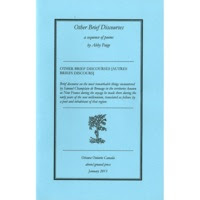The Double Bind Dictionary by Helen Hajnoczky
Influence (“poem” broadside #316) by Sonnet L'Abbe
Both titles published by above/ground press, 2013.
Instantaneous
– that’s how I’d best describe Helen Hajnoczky’s style. Cascading imperatives
grounded by physical surroundings that, upon each poem’s spiral, complete a curious
mental image. Just try to resist her commanding flow and read them slowly; it
feels unnatural. These are poems to get caught up in and they suit the chapbook
format well, considering they’re part of a more sprawling body of work Hajnoczky
is calling Magyarazni, in which poems are written for words chosen from the
Hungarian alphabet.
In The
Double Bind Dictionary’s more intimate table of contents, Hajnoczky has
selected poems derived from words that feature multi-character Hungarian letters:
cs, dz, dzs, gy, ly, ny, sz, ty, and zs. A title like “Gyogyul” may signal a
bumpy path (my online research suggests a translation of “recovery”) but it
needn’t shed light on the poem that follows:
“grip
rum and hack.
gargle
with salt water.
you’ll
go from groaning
to
glowing
it’s
hard to see but
levitate
– leave ash and
wipe
your fingers
you
hold fever in your hands.
a
warm towel around your neck
you’ll
feel better after
you’re
wrapped in sour wine
and
water, soup swells
and
boils but
your
throat will heal
do
you feel better now?
oh
well, honey,
have
some tea.
someone’s
always
there
for you
when
you’re sick.
now
go to sleep.”
Hajnoczky’s
work offers a direct study in cadence, in no small part giving a poem like
“Gyogyul” its effortless readability, but that isn’t to say The Double Bind
Dictionary leaves nothing to digest. Rogue thoughts tend to poke out like
sticks in spokes. Amid calling out ways to become a “more malleable Hungarian”
in “Cserkeszek”, Hajnoczky drops this little gem:
“wonder
how well you know friends
who
you cannot express yourself to –
who
you cannot understand.”
And later in
“Zsibbad”:
“you
preserve what you picked out
canned
it, keep the jars up on the
shelf,
guard it carefully
for
special occasions
though
you won’t take it down
though
you forget what it
tastes
like, wouldn’t recognize
the
flavour
if
you dipped in a spoon –
stale
now, anyway.”
These
stanzas burst out of Hajnoczky’s greater linguistic muse and attach themselves
to the reader’s psyche, often requiring a slower, contemplative re-read. It’s
an intensely quotable chapbook for that reason, not to mention a promising
precursor to her Magyarazni project.
When I first
moved to Ottawa and researched its literary scene, every article about above/ground
press mentioned its prolific means of publishing new and newer work. Broadsides,
which founder rob mclennan designed as single-sheet, folded handouts, surely play
a role in above/ground’s fertile masterplan but, more importantly, they showcase
creative talents in single, brief glimpses.
With
Influence, Sonnet L'Abbe filters visual poetry’s pensiveness down to its core
delight: eliciting a response. In this case (and for this reader, although I’d venture
to conclude that many winter-sick poetry lovers feel the same), that response
is of longing. But “leaves of grass”, stretched and enunciated so broodingly
from the roots up, twists zen-like thanks to L’Abbe’s aesthetic choice, with
each curve of letters encouraging the phrase like a calming mantra. More,
please.





